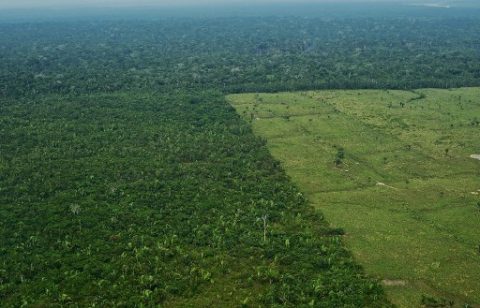
Parts of the Western Amazon rainforest have suffered some of the heaviest deforestion in the Amazon as a whole, with figures putting it at a third higher than last year. Illegal logging has been hard to police in a country in economic crisis. / AFP/
by Sebastian Smith
Agence France Presse
RIO DE JANEIRO, Brazil (AFP) — Endangered Amazon hardwood trafficked by a Brazilian exporter allegedly behind the massacre of nine farmers this year is being sold unimpeded around the world, according to environmental pressure group Greenpeace.
The group said Tuesday that the purchase of products by importers from as far apart as Japan and the United States illustrates lack of control over a logging industry ravaging the world’s greatest rainforest.
In its report on “blood-stained timber,” Greenpeace catalogued continued large-scale shipments from the Madeireira Cedroarana sawmill in the months following the April 19 massacre.
Police accuse the company’s owner, Valdelir Joao de Souza, of sending a death squad dubbed “the hooded ones” to attack poor farmers in the way of logging expansion in a timber-rich area of Mato Grosso state.
Victims were tortured, then shot or hacked to death, at least one of them with his hands tied behind his back. De Souza has been charged but is currently evading arrest.
Despite the scandal, de Souza’s “timber milling and export operations continue unimpeded, as witnessed by Greenpeace during a July 2017 field expedition,” the report said.
Greenpeace said companies in France, the Netherlands and the United States were the biggest importers of Cedro Arana timber in the last year.
Clients were also located in Belgium, Canada, Denmark, Germany, Italy and Japan, the report said, citing trading data.
“On the day of the massacre, the company shipped loads of timber to the United States and Europe,” Greenpeace said.
The massacre of the nine farmers in a remote area was especially bloody, but hardly shocking in a country where 60,000 people are murdered each year.
Far-flung regions, where powerful ranchers and loggers are blamed by environmentalists for massive deforestation, are among the most dangerous.
“Such brutal violence is a feature of the everyday lives of rural communities in Brazil, especially in the Amazon, where violent conflicts over land are a frequent occurrence, driven both by illegal loggers and by land grabbers who clear the forest illegally to grow crops or pasture cattle,” the Greenpeace report said.
The report said that the story of the Mato Grosso massacre and the apparent impunity so far for the alleged mastermind’s company reflects much broader brutality and illegality in the Amazon timber industry.
“Many of the deaths and much of the violence that have occurred in recent decades could have been prevented if the problem of illegal logging had been taken seriously by successive Brazilian governments,” Greenpeace said.
But foreign companies have an equal responsibility, the report said, stressing that seemingly strict US and EU legislation against illegal wood imports is not properly applied.
Human cost of wood
The Brazilian rainforest is a huge source for the world’s supply of hardwood used in furniture, garden decking and other outdoor uses. What few people realize as they shop, however, is the extent of the human cost back in Brazil.
The Pastoral Land Commission, which monitors violence, says there have been 18,012 land conflicts, resulting in 1,722 deaths, across Brazil between 1985 and 2016. Only 31 people were convicted in those crimes.
Rondonia state — which borders Mato Grosso, where April’s massacre took place — is the most deadly for land conflicts, accounting for 21 out of the 61 killings in 2016, the commission said.
“Brazil is now the most dangerous place in the world to defend the land and the environment,” Greenpeace said.
“Many of these murders are linked to illegal logging, especially in the Amazon.”
According to the most recent survey by the Institute of Man and Environment of Amazonia, illegal logging was carried out between 2011 and 2012 in 78 percent of areas exploited in the state of Para and 54 percent of those in Mato Grosso state.
The report can be seen at: www.greenpeace.org.br/hubfs/Greenpeace_BloodStainedTimber_2017.pdf
© Agence France-Presse








